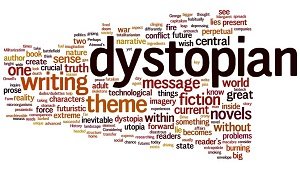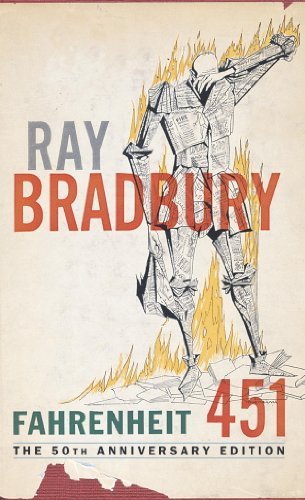Key Points Dystopian Novel | Fahrenheit 451 by Ray Bradbury


The fourth in a series concerning various dystopian novels.
Introduction
The futuristic and dystopic story Fahrenheit 451 was published in 1953. A year later the dystopian treatise won the American Academy of Arts and Letters Award in Literature and the Commonwealth Club of California Gold Medal.
First paragraph
“IT WAS A PLEASURE TO BURN. IT was a special pleasure to see things eaten, to see things blackened and changed. With the brass nozzle in his fists, with this great python spitting its venomous kerosene upon the world, the blood pounded in his head, and his hands were the hands of some amazing conductor playing all the symphonies of blazing and burning to bring down the tatters and charcoal ruins of history. With his symbolic helmet numbered 451 on his stolid head, and his eyes all orange flame with the thought of what came next, he flicked the igniter and the house jumped up in a gorging fire that burned the evening sky red and yellow and black. He strode in a swarm of fireflies. He wanted above all, like the old joke, to shove a marshmallow on a stick in the furnace, while the flapping pigeon-winged books died on the porch and lawn of the house. While the books went up in sparkling whirls and blew away on a wind turned dark with burning.”
The issues the book is addressing
- Censorship
- Biblioclasm; All books are basically considered “hate speech” that could pollute the minds of the people and make them “unhappy”.
Both resulting in an uneducated dumbed-down and hedonistic society of people who lost the skills of using their intellectual faculties.
Symbols
- The firehouse: The headquarters from which the governmental book censorship law is executed
- Firemen: Biblioclastic government agents. Sometimes they even murder those who 'rebel' against the instituted book censorship law. They are the antagonists of the story.
- Fire and burning: Both are used in the narrative as metaphorical articles. Books are put on fire to drive away knowledge and wisdom (intellectualism) and real growth from society. Through fire people were murdered to silence their voices and opposition to the State. The questions of Clarisse McClellan are like friendly fire towards Montag and creates a new awareness, a new consciousness in his being. There is a burning inside of Montag that develops a curiosity and eventually he starts reading many books. These paragraphs in chapter 3 beautifully describes burning of the sun as an analogical element:
“And what lights the sun? Its own fire. And the sun goes on, day after day, burning and burning. The sun and time. The sun and time and burning. Burning. The river bobbled him along gently. Burning.”
“The sun burned every day. It burned Time. The world rushed in a circle and turned on its axis and time was busy burning the years and the people anyway, without any help from him. So if he burnt things with the firemen, and the sun burnt Time, that meant that everything burned!”
The appearance of the sun has multifarious interpretations. It strengthens the imagery of the governments’ vigor to outlaw books through fire. It also stands for the heat of ignorance of the hedonistic citizens for the rich knowledge literature can add to their existence. The sun also mirrors the suppressed spirit of mankind upon the heads of the government officials and agents that eventually demand freedom of thought.
- Guy Montag: A fireman whose character changes as the narrative develops from an antagonistic perspective to protagonistic presentation of the subject matter.
- Clarisse McClellan (the high-school girl): Protagonistic thought provoking character who stands for reason, freedom of consciousness, freedom of thought.
- Captain Beatty: The personification of the government book censorship legislation.
- The Book People: They stand for hopefully all of us who want to preserve intellectual freedom. This includes freedom of opinion and speech but most of all freedom to access knowledge and the ability to utilize it. These characters in this book always makes me slightly emotional. The idea that one day books will be outlawed and people willing to memorize an entire book or chapters of a book to preserve intellectualism has really touched me to the core. Indeed, it is not unimaginable that this dystopian future will be current one day. I certainly would be willing to be one of the Book People ready to memorize a book or a bunch of chapters of a book myself! I would choose sections of the Hebrew Bible and perhaps a chapter of one of Charles Dickens narratives. What or which book(s) would you choose to memorize? Is it plausible that one day literacy is considered to be a crime?
The Book People: "We're book-burners, too. We read the books and burnt them, afraid they'd be found. "We are all bits and pieces of history and literature and international law (...)". When the war's over, perhaps we can be of some use in the world." And when the war's over, some day, some year, the books can be written again, the people will be called in, one by one, to recite what they know and we'll set it up in type until another Dark Age, when we might have to do the whole damn thing over again. But that's the wonderful thing about man; he never gets so discouraged or disgusted that he gives up doing it all over again, because he knows very well it is important and worth the doing."
Aphorisms
“burn 'em to ashes, then burn the ashes.”
“A book is a loaded gun in the house next door. Burn it.”
“Fire is bright and fire is clean."
Interesting quotes
"Burn 'em to ashes, then burn the ashes. That's our official slogan."
“They walked still further and the girl said, "Is it true that long ago firemen put fires out instead of going to start them?" "No. Houses. have always been fireproof, take my word for it." "Strange. I heard once that a long time ago houses used to burn by accident and they needed firemen to stop the flames." He laughed.”
"You can't ever have my books," she said. "You know the law," said Beatty. "Where's your common sense? None of those books agree with each other. You've been locked up here for years with a regular damned Tower of Babel. Snap out of it! The people in those books never lived. Come on now!" She shook her head.”
"Coloured people don't like Little Black Sambo. Burn it. White people don't feel good about Uncle Tom's Cabin. Burn it. Someone's written a book on tobacco and cancer of the lungs? The cigarette people are weeping? Burn the book. Serenity, Montag. Peace, Montag.”
"There must be something in books, things we can't imagine, to make a woman stay in a burning house; there must be something there. You don't stay for nothing."
“The home environment can undo a lot you try to do at school. That's why we've lowered the kindergarten age year after year until now we're almost snatching them from the cradle.”
"I am Plato's Republic. Like to read Marcus Aurelius? Mr. Simmons is Marcus.
“How do you do?" said Mr. Simmons. "Hello," said Montag. "I want you to meet Jonathan Swift, the author of that evil political book, Gulliver's Travels! And this other fellow is Charles Darwin, and-this one is Schopenhauer, and this one is Einstein, and this one here at my elbow is Mr. Albert Schweitzer, a very kind philosopher indeed. Here we all are, Montag. Aristophanes and Mahatma Gandhi and Gautama Buddha and Confucius and Thomas Love Peacock and Thomas Jefferson and Mr. Lincoln, if you please. We are also Matthew, Mark, Luke, and John. Everyone laughed quietly.”
Critique
- Censorship and biblioclasm. Both resulting in an uneducated dumbed-down and hedonistic society of people who lost the skills of using their intellectual faculties. A well-informed citizenry can pose a treat for any government with totalitarian flirtations. A non-informed citizenry is easier to control and manipulate. Freedom of conscience is very pivotal in an open democratic society.
- Book burnings are an assault on freedom of thought and intellectualism. The freedom to choose what we do or do not wish to read and opine upon. It’s intellectual lobotomization. It’s destroying knowledge from people’s intellectual verbal quiver and the ability to be informed and rise against unrighteous government interference.
- The use of machines, devices aka technology in society that can drain the life out of humanity. Do we use them or are we used by them?
Last paragraph
“But now there was a long morning's walk until noon, and if the men were silent it was because there was everything to think about and much to remember. Perhaps later in the morning, when the sun was up and had warmed them, they would begin to talk, or just say the things they remembered, to be sure they were there, to be absolutely certain that things were safe in them. Montag felt the slow stir of words, the slow simmer. And when it came to his turn, what could he say, what could he offer on a day like this, to make the trip a little easier? To everything there is a season. Yes. *A time to break down, and a time to build up. Yes. A time to keep silence and a time to speak. Yes, all that. But what else. What else? Something, something . . **And on either side of the river was there a tree of life, which bare twelve manner of fruits, and yielded her fruit every month; And the leaves of the tree were for the healing of the nations. Yes, thought Montag, that's the one I'll save for noon. For noon...When we reach the city.”
*Taken from Ecclesiastes (Bible)
** Taken from the book of Revelation (Bible)
//END OF KEY POINTS//
Also read
- Key Points Dystopian Novel | The Time Machine by H.G. Wells
- Key Points Dystopian Novel | Animal Farm by George Orwell
- Key Points Dystopian Novel | Harrison Bergeron by Kurt Vonnegut
Coming soon
- Key Points Dystopian Novel | 1984 by George Orwell
- Key Points Dystopian Novel | The Hunger Games by Suzanne Collins
- Key Points Dystopian Novel | A Brave New World by Aldous Huxley | Part 1: Conditioning and Soma
- Key Points Dystopian Novel | A Brave New World by Aldous Huxley | Part 2: Sex
- Key Points Dystopian Novel | A Brave New World by Aldous Huxley | Part 3: Family
- Key Points Dystopian Novel | A Brave New World by Aldous Huxley | Part 4: Alpha, Beta, Gamma, Delta, Epsilon
- Key Points Dystopian Novel | A Brave New World by Aldous Huxley | Part 5: Separation
- Key Points Dystopian Novel | Atlas Shrugged by Ayn Rand
- Key Points Dystopian Novel | Logan's Run by William F. Nolan & George Clayton Johnson
- Key Points Dystopian Novel | The Fixed Period by Anthony Trollope
- Key Points Dystopian Novel | The Handmaid's Tale by Margaret Atwood
- Key Points Dystopian Novel | Demons by Dostoyevsky

Very interesting your article, nice job. Have a nice day.
I will follow you, follow me back if u want much fun and amazing picture everyday.
Thank you!